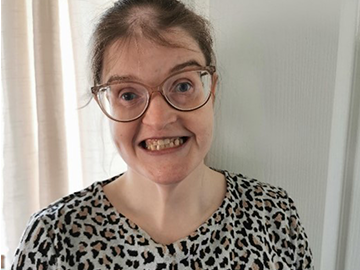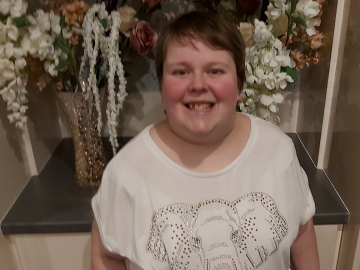Chaos to calm – Tara’s Prader-Willi syndrome story
The words “blood test” were whispered between staff at our Uttoxeter services, who were carefully devising a way to make the medical experience less daunting for someone we support, cautious of the impending chaos they had been warned could occur if uttered any louder.
But their conversation had been overheard – it was too late. Within a few moments, one thousand pieces of jigsaw, a wardrobe full of clothes and all moveable items of furniture were strewn across two flights of stairs.
The culprit? Not who you’d expect …
Bubbling with fury in the midst of it all stood the petite frame of a young lady – just shy of 5ft, but with a strength resembling that of the Hulk. These episodes of violent destruction were all too common for Tara*, who had moved into our services in July 2010.
Tara* has a learning difficulty and Prader-Willi syndrome, a rare genetic condition that affects just 2,000 people in the UK. This causes a variety of physical, emotional and mental effects, but for Tara*, these are mostly focused around weight management and challenging behaviours.
Although she can communicate effectively and with good vocabulary, she sometimes has difficulty in understanding and needs patient explanations – especially if plans have to be changed. When she first moved in, Tara* found the change difficult to manage, resisting support from staff.
This resulted in physical assaults on staff, channelling her inner wrestler to show remarkable physical ability when she was upset, and ear-piercing screams whilst pacing the garden. She would refuse interaction, sitting at the top of the fire exit to block out the world or absconding to escape her frustrations.
Tara’s* diet was also a big concern. Every meal presented to her was scrutinised, with real or imagined variations in shape, colour or size of food causing upset and distress to Tara*. She expressed her own concerns to staff stating:
“I would love to grow taller but I’m very afraid of ‘growing outwards’”.
All of this, as well as her refusal to have vital blood tests, meant Tara* was not only unhappy, but was in danger of having serious medical implications.
Things needed to change, and luckily, as time went on, they did. It wasn’t without its difficulties, but with gentle persistence and considerate consistency, Tara* began to learn to trust the very caring staff at our services.
Working with Tara*
To combat Tara’s* challenging behaviours, staff worked closely with her and her family to establish a weekly activity plan that would offer her some security in her daily routine. This involved a discussion around what was important to her and including her whilst planning activities.
Now, she enjoys a variety of activities in a managed timetable that allays her anxieties that used to lead to her challenging behaviour. This includes time for family visits, practising her Catholic faith, enjoying long walks in the countryside and swimming, amongst others, to focus her energy.
With encouragement, she also worked with staff to develop a set menu, which she discusses with her keyworkers at monthly meetings. This means that she eats between 1,200 and 1,400 calories per day to ensure she remains at a healthy weight.
These small, but effective measures have made a significant difference to Tara’s* happiness and quality of life. Compared to her early years at our services, she is now far more relaxed, willing to listen to staff without losing her temper.
Margaret, one of Tara’s support workers at our services, describes her transformation, stating:
“We still have a few wobbles from time to time, but she listens to explanations and appears to appreciate we want to do our very best for her.”
And the miracles don’t stop there! After years of refusals and intolerance, staff can now freely speak of blood tests and medical appointments without so much as a blink of an eye or a dismantled chest of drawers in sight.
Improvement for Tara*
With careful proposal and reassuring explanations, Tara* miraculously agreed to have her blood taken, much to the open-mouthed disbelief of staff, family and healthcare professionals alike. An un-phased Tara* happily co-operated and hasn’t mentioned the matter since.
This is testament to all of the supportive staff at our service who have worked tirelessly to achieve the best possible outcome for Tara*. And as she sits quietly, tentatively popping number 987 of her 1,000 piece Blue Planet jigsaw into place, staff are confident that her violent destruction and Hulk-like tantrums are a distant memory!
Well Done to Tara* and all of the staff at our service for their hard work and sharing this story!
*Some of the details have been changed for confidentiality reasons.

 Prader-Willi syndrome
Prader-Willi syndrome  More success stories
More success stories 




